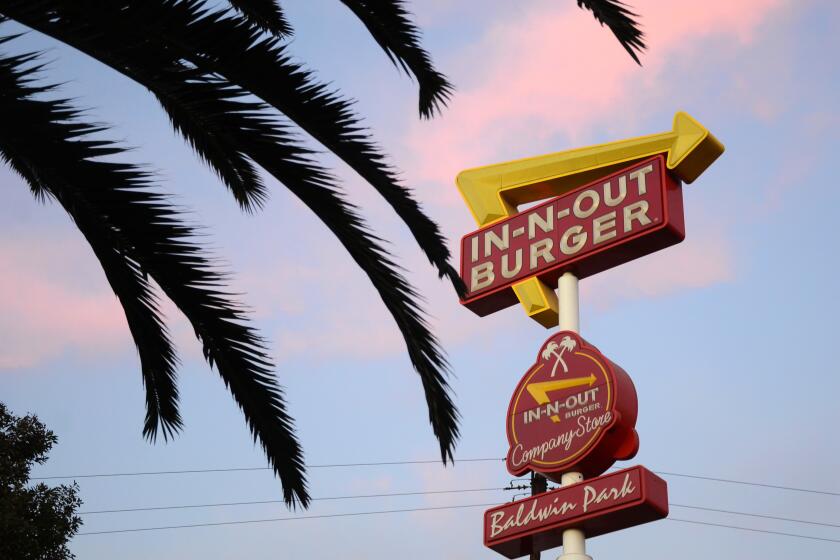Column: With In-N-Out, Tennessee officials are double-doubling down on California

- Share via
Tennessee Gov. Bill Lee sure pulled out all the proverbial stops this week in letting the world know that In-N-Out plans to open a corporate office and restaurants in his state by 2026.
The recently reelected governor claimed in a press release that his state’s “unmatched business climate, skilled workforce and central location” make Tennessee the logical choice for the iconic California fast-food chain’s eastward expansion.
At a press conference alongside In-N-Out’s owner and president, Lynsi Snyder, the governor called the company’s move a “life-changing decision” that cemented Tennessee’s supposed status as a national beacon proving that “America hasn’t lost her way.”
Lee double-doubled down on that grandiose point in a short video posted on social media, praising In-N-Out as a “great American company” with a “value system … that lines up just right in Tennessee.”
You’d think Andrew Jackson and Davy Crockett had spent a day at Dollywood, the way Lee was gushing with Tennessee pride.
In-N-Out Burger, California’s iconic fast-food chain, will make its most eastward expansion yet, with plans to open restaurants and a corporate hub in Tennessee in 2026.
The announcement unsurprisingly went viral because In-N-Out — a West Coast thing in the American culinary psyche — is now readying to invade the South. I don’t fault the company’s ambitions, even if I do think their burgers are overrated. Snyder has the right to expand, even if palm trees and hot rods don’t exactly pair well with walking horses and the Great Smoky Mountains.
But largely overlooked in all the hubbub around In-N-Out’s plans is the continuation of a strategy that has seen Tennessee’s government use California for the last 20 years to battle an identity crisis.
Although still overwhelmingly white — 73%, according to the most recent census figures — the state has become exponentially more diverse, sparking Tennessee legislators to propose bills that would ban lessons on Islam before high school and make life miserable for undocumented immigrants. Fears expressed on talk radio and in political campaigns that cities are turning into Atlanta are thinly veiled anti-Black dog whistles.
Meanwhile, Californians continue to move in, exulting in the lower cost of living while driving up prices for lifelong residents. Kid Rock appeared on Tucker Carlson’s rancid show last year to rail about “an invasion from the state of California” that is changing life in his home state, where he’s lived only since 2017 after moving from ... Malibu.
So what have Gov. Lee and his predecessors done to quell such grumbles? Make Tennessee great again … by bringing in more California.
For years, Californians have flocked to states like Texas, Arizona and Nevada. Less recognized is the growing number of people leaving for Tennessee.
States across the country have benefited from our exiles for decades, of course. But Tennessee is trying to tap into our greatness like a wildcatter drilling into someone else’s oil field.
This movement started in earnest in 2005, when Nissan announced it was relocating its U.S. headquarters from Gardena to the Nashville suburb of Franklin, which made national headlines. An editorial in the Tennessean, the state’s biggest newspaper, stated that employees of the automobile giant “would be able to buy twice as much house for half as much money.”
More California corporations big and small have followed, from the parent corporation of Carl’s Jr. — another beloved Southern California burger chain — in 2018 to slushie makers Icee the following year. A Hoover Institution report released last fall showed that 31 California companies moved to Tennessee from 2018 to 2021, trailing only Texas.
Lee’s predecessor, Bill Haslam, took West Coast trips to pitch his state to CEOs. Lee shot a video on the steps of Tennessee’s state Capitol in 2019 to brag how he was “California dreamin’” in announcing he had nabbed two more companies.
“There’s a lot of chatter out West about why it is that companies are coming to Tennessee,” Lee said in the video, before declaring it was all about the state’s low taxes and business-friendly environment.
He’s not completely wrong. Tennessee has no income tax and fewer regulations than California. There’s also the billions of dollars the state has spent to entice companies to set up shop there.
Nissan got over $200 million to ditch Gardena. Oracle — which left Silicon Valley for Austin in 2020 — will get $240 million for its new Nashville campus via state grants and local reimbursements.
Lee’s press secretary passed me off to someone with the Tennessee Department of Economic & Community Development when I asked whether the state will offer the same largesse to In-N-Out. That person didn’t get back to me.
But hey, if Carl’s Jr., whose burgers went south long before they moved their headquarters to the region, could get at least $2 million to ease its relocation, surely Snyder deserves more.
It’s the exact type of giveaway that conservatives decry when California funds social programs or subsidizes efforts to combat climate change.
Instead of investing in its own residents, Tennessee officials want to import a Californian type — disaffected, nostalgic for a made-up past when nothing went wrong in the Golden State, wanting all of the easy and none of the hard. Lee and his ilk make out these California quitters to be like Tennessee’s frontiersmen of yore, mythologized as brave pioneers who tamed a wild, untapped land even as they largely settle in suburbs.
I don’t come at all this as a liberal, out-of-touch Californian. Why, I extolled Tennessee just last weekend to cousins who were wondering why so many of their friends were buying homes out there. When they joked about rednecks and Klan members, I responded that the countryside would remind them of the villages of our parents, while the lifestyle meshes well with our rancho libertarian ways.
Before the pandemic, my wife and I traveled through Tennessee every summer beginning in 2007, winding through the small towns along U.S. Route 127, which bisects the eastern part of the state. We looked for antiques and whiskey from the Kentucky border down to Chattanooga, where we took Interstate 24 toward Nashville, then caught Interstate 40 back home.
Folks in bigger cities treated us as interlopers. In smaller towns like Pikeville, Jamestown and Clarkrange, residents received us kindly even as they joked about having no idea why Californians drove out all the way to their parts. As the years went on, I saw the metro areas explode in wealth while the country parts declined.
We’d relax for a few hours in Pall Mall at Sgt. Alvin C. York State Historic Park, named after a World War I hero whose service is largely forgotten everywhere except his home state.
He was a national celebrity for decades — Gary Cooper won an Academy Award for portraying him. York saved his money from speaking engagements to open a high school that still continues under his goal of giving rural Tennesseans like him a step up.
About an hour south from Pall Mall is Crossville, one of the bigger cities along U.S. Route 127 at just over 12,000. My wife and I always spent a night at a Holiday Inn Express there.
The first couple of years, dinner was at the nearby Bean Pot Restaurant, a 24-hour spot that hosted locals and out-of-towners alike. It closed in 2012, stayed vacant for years and was an empty lot last time I saw it.
Maybe Gov. Lee can put an In-N-Out there.
More to Read
Sign up for Essential California
The most important California stories and recommendations in your inbox every morning.
You may occasionally receive promotional content from the Los Angeles Times.













